
No More States? : Globalization, National Self-determination, and Terrorism Hardback
Edited by Richard N. Rosecrance, Arthur A. Stein
Hardback
Description
The twentieth century witnessed an explosion of new nations carved out of existing ramshackle empires and multiethnic states.
Many observers contend that the creation of new states will continue indefinitely, with the two hundred of today becoming the four hundred of tomorrow as more groups seek independence.
This provocative and compelling book explores the impact of globalization and terrorism on this trend, arguing convincingly that the era of national self-determination has finally come to an end. Examining the forces that determine the emergence of new nation-states, the distinguished contributors consider a rich array of specific cases from the Middle East, Asia, North America, Europe, and Russia where new states could be created. They contend that globalization, rather than expanding such opportunities, is not as friendly to new weak states with limited resources as it is to established rich nations.
Given the vast sums circulating in the world market, few fledgling nations can be financially independent.
They find it more prudent to shelter within the protective embrace of existing federations.
Equally, governments of federal states can induce restive petitioners_such as Quebec, Scotland, and the Basques_to remain inside the metropolitan boundary through a system of tangible restraints and rewards.
Those who reject the benefits, such as rebels in Chechnya and Aceh, will fail in their bids for independence.
Taiwan_poised on a knife-edge between integration with China and independence_faces a series of costs and diminished returns if it seeks full statehood.
Finally, terrorism has lost its legitimacy as a technique for gaining independence in the eyes of the international community. Despite the stall in new state formation, there has been no sign of successful military or imperial expansion by established countries toward consolidation into fewer, larger national units.
Neither aggression by regional states_such as the Iraq invasion of Kuwait in 1990, nor intervention_such as the U.S. occupation of Iraq in 2003, are likely to succeed. On balance, the book concludes, discontented national movements will have to find ways to exist within current geopolitical boundaries.
Information
-
Available to Order - This title is available to order, with delivery expected within 2 weeks
- Format:Hardback
- Pages:316 pages
- Publisher:Rowman & Littlefield
- Publication Date:04/08/2006
- Category:
- ISBN:9780742539433
Information
-
Available to Order - This title is available to order, with delivery expected within 2 weeks
- Format:Hardback
- Pages:316 pages
- Publisher:Rowman & Littlefield
- Publication Date:04/08/2006
- Category:
- ISBN:9780742539433






